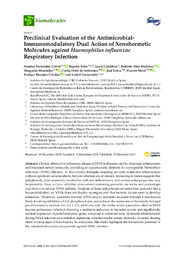Título :
Preclinical Evaluation of the Antimicrobial-
Immunomodulatory Dual Action of Xenohormetic
Molecules against Haemophilus influenzae
Respiratory Infection |
Autor :
Fernández Calvet, Ariadna
Euba, Begoña
Caballero, Lucía
Díez Martínez, Roberto
Menéndez, Margarita
Ortiz de Solórzano, Carlos
Leiva, José
Vicente Micol, Vicente
Barrajón-Catalán, Enrique
Garmendia, Junkal |
Departamento:
Departamentos de la UMH::Ingeniería |
Fecha de publicación:
2019-12-17 |
URI :
http://hdl.handle.net/11000/5894 |
Resumen :
Chronic obstructive pulmonary disease (COPD) is characterized by abnormal inflammation and impaired airway immunity, providing an opportunistic platform for nontypeable Haemophilus influenzae (NTHi) infection. In this context, therapies targeting not only overactive inflammation without significant adverse effects, but also infection are of interest. Increasing evidence suggests that polyphenols, plant secondary metabolites with anti-inflammatory and antimicrobial properties, may be protective. Here, a Cistus salviifolius plant extract containing quercetin, myricetin, and punicalagin was shown to reduce NTHi viability. Analysis of these polyphenols revealed that quercetin has a bactericidal effect on NTHi, does not display synergies, and that bacteria do not seem to develop resistance. Moreover, quercetin lowered NTHi airway epithelial invasion through a mechanism likely involving inhibition of Akt phosphorylation, and reduced the expression of bacterially-induced proinflammatory markers il-8, cxcl-1, il-6, pde4b, and tnfα. We further tested quercetin’s effect on NTHi murine pulmonary infection, showing a moderate reduction in bacterial counts and significantly reduced expression of proinflammatory genes, compared to untreated mice. Quercetin administration during NTHi infection on a zebrafish septicemia infection model system showed a bacterial clearing effect without signs of host toxicity. In conclusion, this study highlights the therapeutic potential of the xenohormetic molecule quercetin against NTHi infection.
|
Palabras clave/Materias:
polyphenol
xenohormesis
Haemophilus influenzae
antimicrobial
anti-inflammatory
respiratory infection |
Área de conocimiento :
Ingeniería. Tecnología |
Tipo de documento :
info:eu-repo/semantics/article |
Derechos de acceso:
info:eu-repo/semantics/openAccess |
DOI :
http://dx.doi.org/10.3390/biom9120891 |
Aparece en las colecciones:
Artículos - Ingeniería
|
 La licencia se describe como: Atribución-NonComercial-NoDerivada 4.0 Internacional.
La licencia se describe como: Atribución-NonComercial-NoDerivada 4.0 Internacional.
.png)
